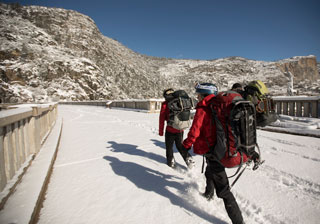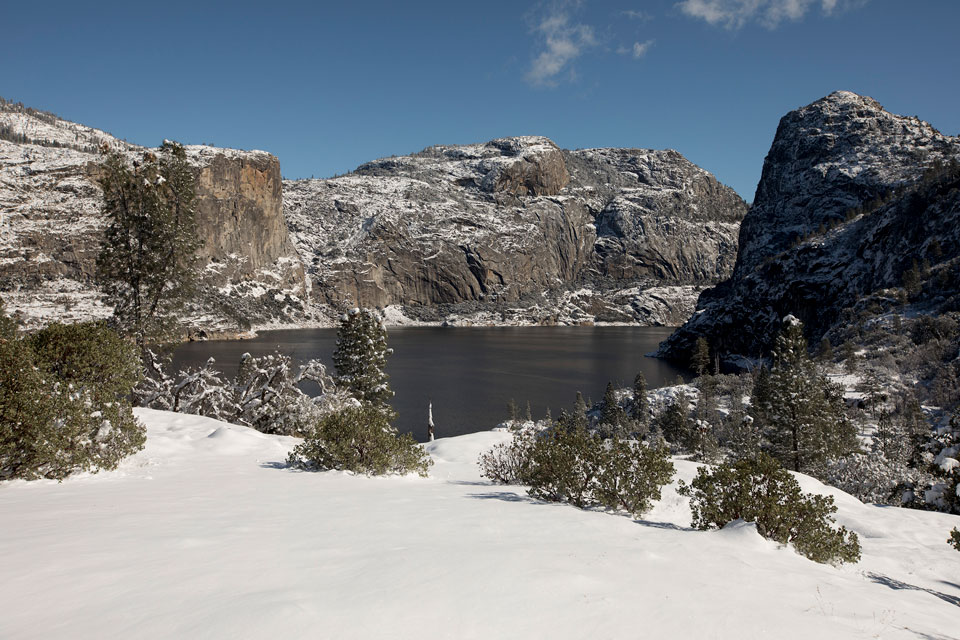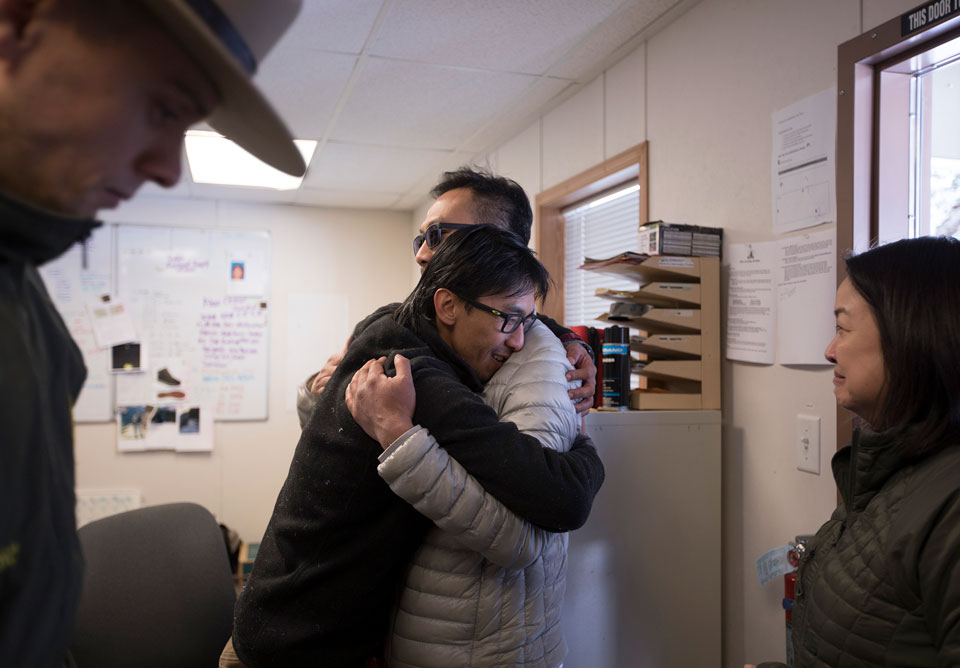On Tuesday, February 20, 2018, Alan Chow was reported overdue from an overnight hike in the Hetch Hetchy Reservoir area of Yosemite National Park. He was found by searchers on Friday, February 23, 2018, in the Falls Creek drainage north of Wapama Falls. He had become stranded off trail, and after failing to find a safe route out, made camp and waited for help.
At approximately 3:30 am on Saturday, February 17, 2018, Alan Chow left his residence in Oakland, CA for Yosemite National Park. Chow had vague plans to come to Yosemite and go on a one-night backpacking trip—his first overnight in the wilderness. Prior to this, Chow had done some day hiking in various national parks, but had not spent the night out in a self-sufficient manner.
Chow had taken several courses covering backpacking basics, winter camping basics, and backpacking in Yosemite. During one of these courses, Chow heard about Hetch Hetchy and how it was quieter than the rest of the park. Chow had been equipping himself from outdoor stores. His gear was of good quality, but, as he stated later, he had “no winter clothes.” Chow’s only map was the map provided at the entrance station. Chow described this map as inadequate for navigation and “a joke.” He did not have a GPS but did have a compass. Chow has a rudimentary knowledge of navigation, but no formal training.
He decided on his exact itinerary when he got to the Hetch Hetchy Entrance at 7:30 am. He left his car at the trailhead and began hiking at about 9 am.
Chow’s itinerary had him travelling in a counter-clockwise loop from O’Shaughnessy Dam to Rancheria Falls to the Tiltill Valley to Lake Vernon to Laurel Lake back to the dam. It was unclear from his wilderness permit itinerary if Chow planned to spend one or two nights out. Chow was specific during his debrief that he only intended to spend one night out.
At the trail junction just east of the north end of the tunnel, Chow decided to change his direction of travel from counter-clockwise to clockwise. He did this because he saw on his map that Laurel Lake was closer than Rancheria Falls. Because Chow did not know what he was capable of, i.e., how far he could travel in a day, he opted for the shorter destination. Chow described this as his first mistake.

NPS photo by Amanda Swinhart
After travelling a short distance down the spur trail to Laurel Lake, Chow turned back because trail conditions were too wet for his tastes.
At Beehive Meadow, Chow hiked with another hiker for about 10 minutes. After the two separated, Chow lost the trail. He navigated to a ridge, saw Lake Vernon, and travelled cross country to the lake.
Chow arrived at Lake Vernon at about 3:50 pm and had camp set up on the northwest shore at about 5:15 pm.
Chow was up early, around 4:15 am, on Sunday, February 18. He started hiking at approximately 7 am. Chow’s plan was to return to the dam the same way he had come because he felt it was better to travel on ground he already knew. (This is an example of Chow’s cautious approach to his situation.)
He had found the trail by the lake, so rather than reverse the cross-country route he had taken to the lake, he followed the trail. Chow stated that very shortly after leaving the mouth of Lake Vernon, he lost the trail on rock slabs. Chow met another hiker who stated he had trouble finding the trail the previous day. Chow stated during his debrief that he wished he had asked to tag along with this hiker, who had better maps.
The last photo Chow took on this day was at approximately 7:50 am. Presumably, Chow’s accident took place shortly thereafter.
Chow is unsure of how the accident took place, but somehow he slid down a rock-face with a drop off. Chow sprained his ankle during the landing. Chow described the pain from this injury as “bearable” but noticeable during certain movements. The injury limited Chow’s mobility and capacity for longer travel.
Chow attempted to dial 911 on his cell phone, but had no signal.
Chow did not think he could get out by climbing up the rock face he had fallen down. He ruled out travelling east toward Tiltill Valley because he didn’t know the lay of the land or how far it was to the trail. Because Falls Creek was an obvious navigational aid and water supply, Chow chose to follow the creek towards the reservoir.
Chow travelled down Falls Creek until about 4 pm that afternoon. He set up camp and stayed there from Sunday evening until Wednesday morning.
On Wednesday, Chow saw a search helicopter but was unable to signal it.
On Wednesday morning, Chow broke camp and attempted to hike out to the west. Chow only made it an hour from camp before he turned back due to deep snow, his inability to navigate, and his uncertainty of the trail’s location relative to his position.
Chow returned to his original campsite but relocated his tent to a spot where it would be more visible from the air.
On Thursday night, it snowed heavily.

NPS photo by Amanda Swinhart
On Friday morning, Chow left his tent up and attempted to hike to the reservoir via Falls Creek. He rigged his sleeping bag into a makeshift parka and wore trash bags over his socks to keep his feet dry. Chow arrived at the top of the falls and realized it was impassable. He turned back at the falls and returned to his camp in time to be spotted by the helicopter.

NPS photos by Amanda Swinhart
Equipment
Chow was equipped with good-quality gear but lightly so. He was lacking certain critical items, and, most importantly, adequate maps.
Knowledge and Experience
This was Chow’s first overnight backpacking trip. Chow had taken backpacking classes but lacked both knowledge and experience.
Mindset
Chow’s best asset was his unwillingness to take risks and to stay within his limits. Machismo and ego did not influence Chow’s decision making.
Physical Preparation
Chow does some physical training but is not a “workout warrior” and he is a smoker. His physical preparation does not appear to have been a limiting or contributing factor.
Lessons Learned
Chow stated his lessons learned were:
-
Carry adequate maps.
-
Know how to use map, compass, and GPS.
-
Pay better attention to his footing.
-
Have a better detailed plan.
-
Have a better itinerary and do not veer off it.
-
Be more prepared in general terms.
-
He should have asked the hiker he saw on Sunday morning for assistance route finding.
The following points are important for ensuring a safe journey in any wilderness setting:
-
Have a detailed itinerary.
-
Make sure someone not on the trip knows what the plan is and when/where to report you missing.
-
Do not change your plan unless you have a good reason to.
-
Have adequate navigational tools, including your own knowledgebase. Bring a map, compass, and a GPS, and a thorough knowledge on how to use all three in conjunction.
-
Everyone who does enough hiking eventually loses the trail. Know the basic tactics for finding it again.
-
Maintain situational awareness.
-
Read the weather for a week in advance, not just for the duration of your trip (Chow only knew the weather through Sunday).
-
Despite a benign forecast, don’t trust it. Pack for all weather conditions (within reason).
-
Pack means by which you can signal for help: fire kit, whistle, signal mirror, bright colors, satellite alert device, whistle, plus knowledge of how to use them.
-
Bring the “ten essentials.”
-
Be familiar with how to navigate, layer clothing, stay warm and dry while sleeping, start a fire, and signal.
-
Good judgment and caution are required when things go awry. There is no situation so bad that you cannot make it worse, so do not push your limits. Chow is alive because he did not make his situation worse. He stayed well within his limits and lived because of that.
-
Ego is your enemy in the wilderness. Leave it at home.

